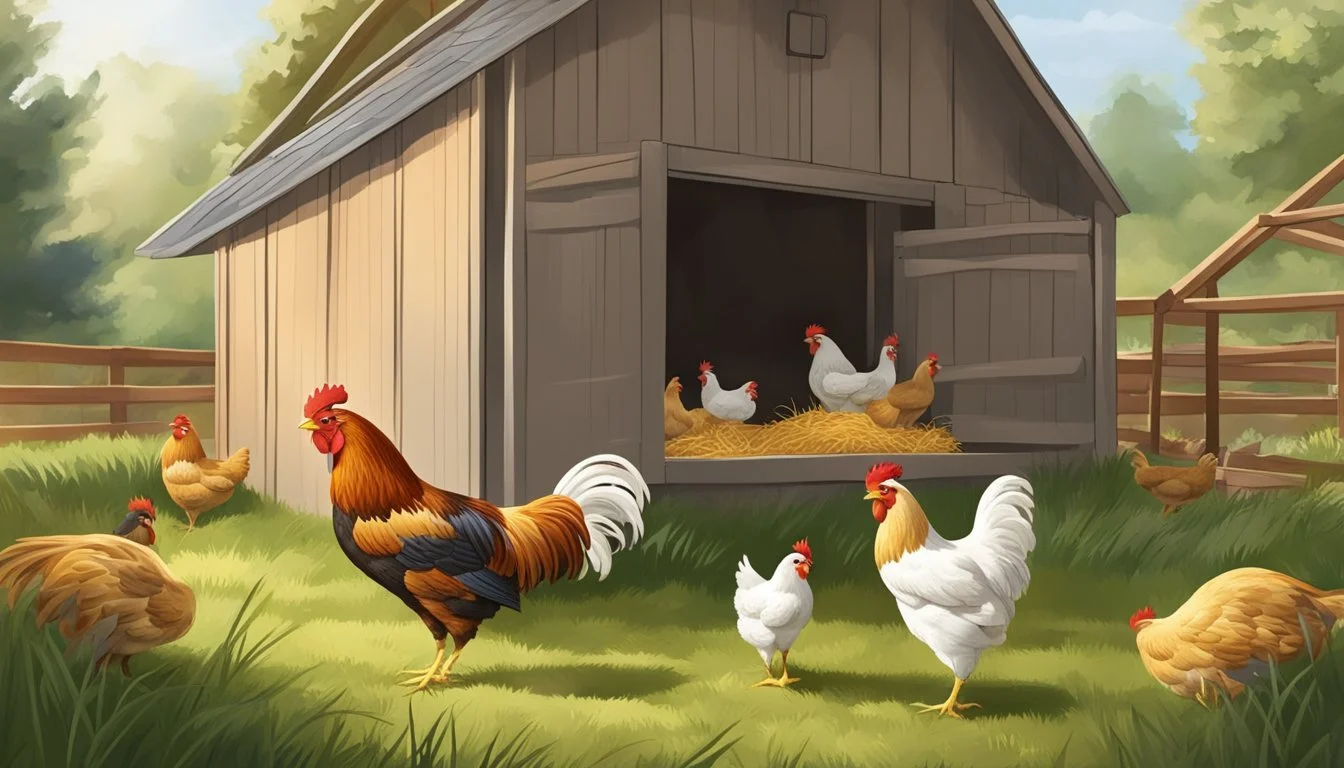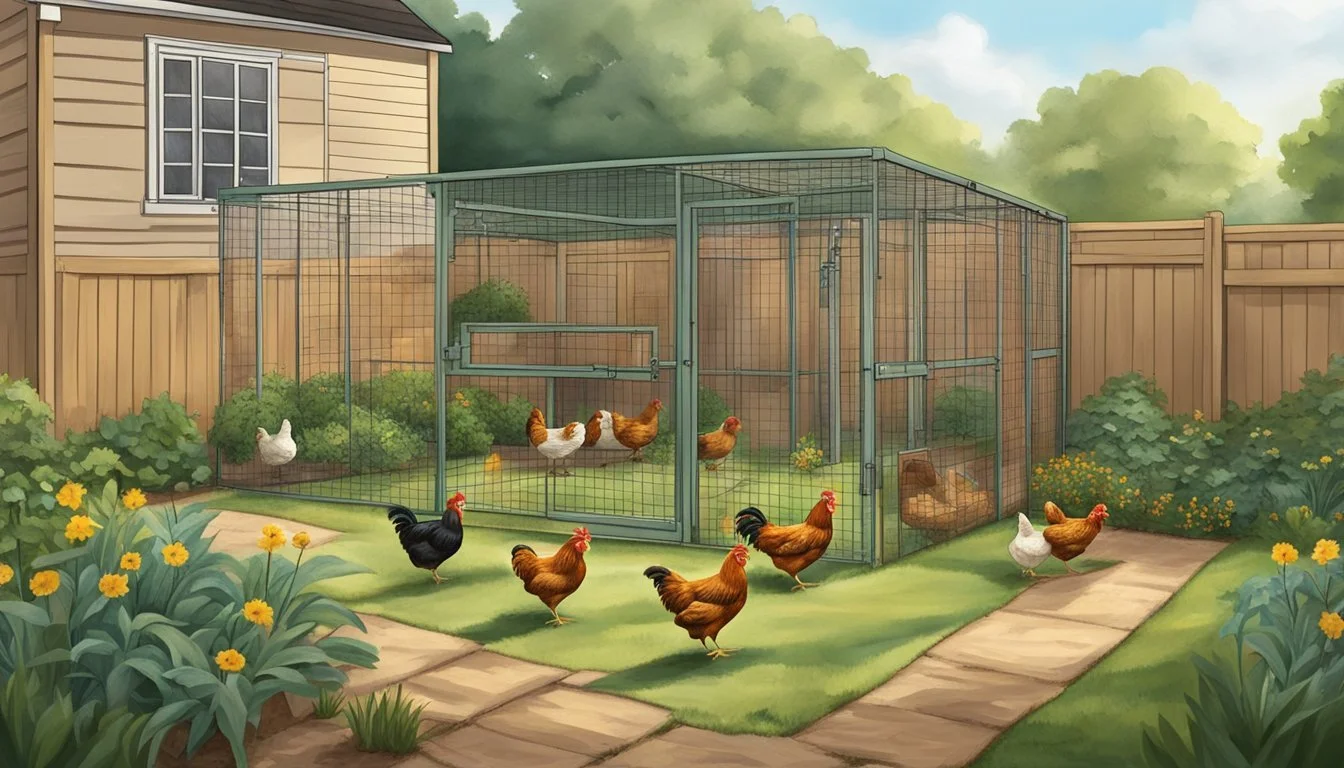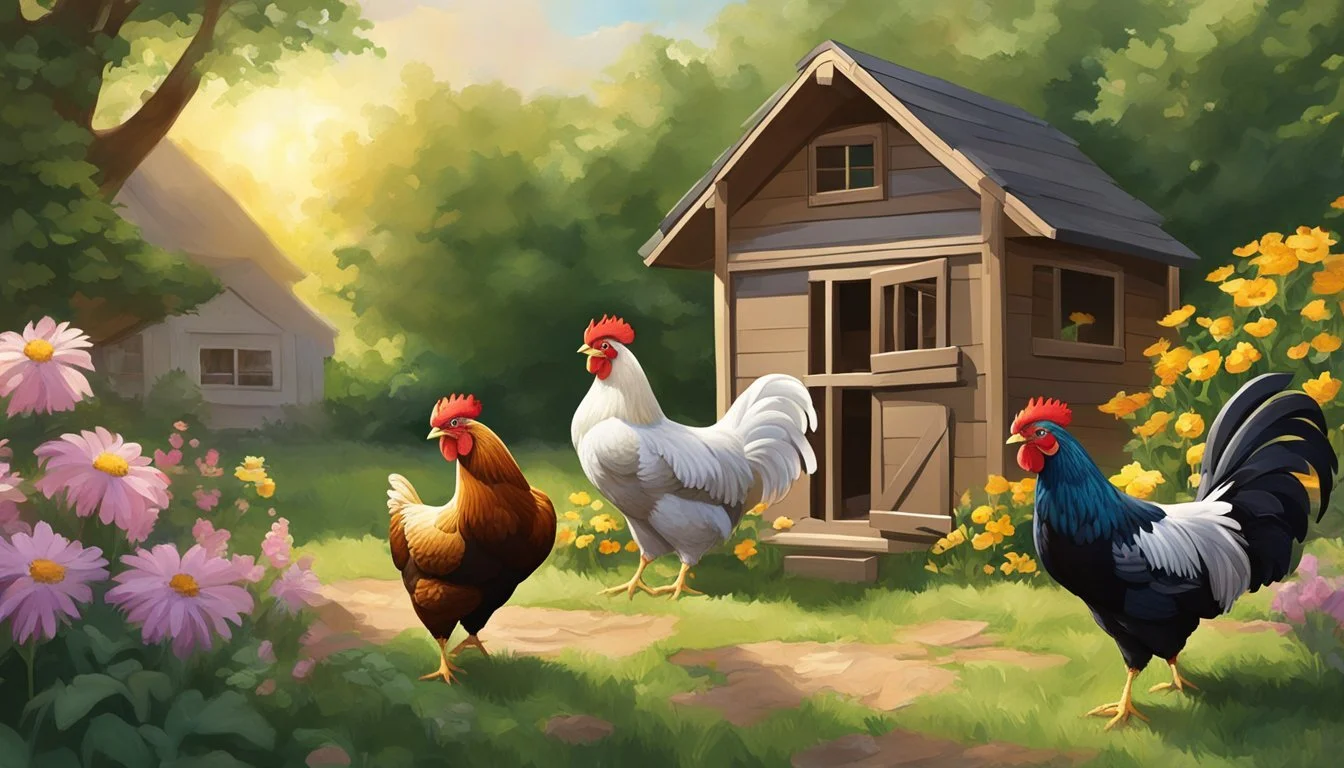Keeping Backyard Chickens in Knoxville, TN
Essential Tips for Urban Poultry Farming
In the city of Knoxville, Tennessee, the practice of keeping backyard chickens is subject to city and county regulations designed to balance urban agriculture with neighborhood harmony. Residents of Knoxville who are interested in raising chickens for eggs, companionship, or as a part of a sustainable lifestyle can generally do so, but it's important to understand the specific legal requirements and guidelines that govern chicken keeping in the area.
The local ordinances determine the number of chickens allowed, housing specifications, and whether roosters are permitted. For example, roosters are prohibited within Knoxville city limits to minimize noise disruptions, and there may also be restrictions on the number of hens one can keep based on property size or zoning laws. Additionally, potential chicken keepers should review any homeowner association rules, as these may have separate stipulations regarding the keeping of poultry.
Prospective chicken owners in Knoxville are also required to obtain a permit, which incurs a fee and necessitates adherence to certain animal welfare and cohabitation standards. It's essential to stay informed about the most current regulations by contacting Knoxville's Animal Control Department or visiting the city's official platforms, as these policies can be updated to reflect new standards for community safety and animal care. This proactive approach ensures that residents of Knoxville can enjoy the benefits of raising backyard chickens while maintaining good standing within the community.
Local Regulations and Ordinances
In Knoxville, TN, the keeping of backyard chickens is regulated by specific local ordinances. Residents must adhere to these rules regarding permits, housing, and the number of chickens allowed.
Understanding Knoxville's Chicken Ordinance
The City of Knoxville enforces an ordinance that establishes the rules for keeping backyard chickens. Ordinance Chapter 5, Article IV, Section 5-102, Sub-section (a) (3) is specifically relevant, dictating that chickens must be kept at least 500 feet from any building regularly inhabited by humans, other than the poultry owner’s residence. This ordinance promotes harmony between urban living and poultry husbandry by implementing zoning restrictions which maintain public health and prevent nuisance.
Permitting Process and Annual Renewal
To legally keep chickens in Knoxville, residents must obtain a permit through the Knoxville Animal Control Department. The permit fee is set at $25.00 and is not a one-time requirement; it involves an annual renewal process. Residents should be aware that changes to the ordinance or permit fees may occur, and staying informed about any updates is advisable.
Number of Chickens and Restrictions on Roosters
There are specific limitations on how many chickens an individual can keep, as well as restrictions on roosters, due to noise concerns. Urban residents typically face stricter constraints compared to those in less densely populated areas. Residents need to refer to the Knoxville local chicken laws and the city code to ensure compliance with the current standards for the allowable number of chickens. Additionally, Knoxville's regulation mandates a fenced enclosure to keep the chickens contained and safe. Understanding and following these regulations is essential for anyone considering raising backyard chickens within city limits.
Setting Up the Coop and Run
When constructing a coop and run in Knoxville, gardeners need to ensure the coop is suitable for their space and the run provides safety and amenity. Proper planning can keep chickens healthy and secure while minimizing any potential nuisance to neighbors.
Choosing the Right Coop for Your Space
A chicken coop should accommodate the number of birds appropriately, as Knoxville regulations allow for a maximum of 6 hens. Space requirements suggest at least 3-4 square feet per bird inside the coop and about 10 square feet per bird in the run. One must ensure the coop is:
Well-ventilated to prevent ammonia buildup and respiratory issues.
Insulated to protect chickens from extreme temperatures.
Easily accessible for cleaning, as a clean coop will reduce odors and pest attraction.
For bedding, pine shavings are preferable because they are absorbent and help keep the coop dry. Replace bedding regularly to maintain a clean environment. Coops can be purchased pre-made, or residents may choose to construct their own.
Designing a Secure and Comfortable Run
A run is the fenced enclosure that gives chickens the freedom to roam outdoors safely. The design of a run should prioritize protection from predators with sturdy materials and construction techniques. Features of a well-designed run include:
Protective Fencing: A tall, secure barrier to keep out predators, with mesh buried at least 12 inches underground to deter digging.
Roof Overhead: Reduces the risk of aerial predators and provides shelter from harsh weather.
Clean Water Source: Chickens should have access to clean water at all times, which needs to be checked and refilled daily.
Straw can be used within the run to provide chickens with a comfortable place to scratch and peck. It’s crucial that the run remains clean to deter pests and maintain a healthy environment for the birds. A clean run also helps mitigate any concerns with odor in residential areas.
Chicken Care and Maintenance
Keeping backyard chickens in Knoxville, TN, requires attention to their dietary needs, health management, and maintaining a clean environment to minimize odors.
Feeding Your Chickens
Chickens need a balanced diet consisting mainly of commercial poultry feed, which ensures they receive the necessary nutrients for good health and egg production. It's essential to provide a consistent supply of feed and fresh water daily. While kitchen scraps can supplement their diet, they should not replace commercial feed and should only be offered in moderation to avoid health issues.
Daily Chicken Diet:
Commercial poultry feed: Follow the guidelines for the specific age and type of your chickens.
Water: Clean, fresh water available at all times.
Kitchen scraps: Limited amounts of fruits, vegetables, and grains.
Health Check-up and Veterinary Care
Regular check-ups by a veterinarian are crucial for maintaining the health of backyard chickens. Early detection of parasites, respiratory conditions, and other common ailments allows for timely and effective treatment. Chicken keepers should familiarize themselves with common symptoms of sickness and consult a vet when they suspect any health issues. Vaccinations and deworming schedules should be adhered to strictly.
Health Checklist:
Regular vet check-ups: At least once a year or as advised by the veterinarian.
Monitor for symptoms: Unusual behavior, changes in eating habits, abnormal droppings.
Preventative care: Vaccinations and deworming as recommended by a vet.
Cleanliness and Odor Control
A clean coop is essential for the health of chickens and to control odors. Coops should be regularly cleaned and bedding replaced to prevent the buildup of waste, which can lead to health problems and unpleasant odors. A well-ventilated coop keeps ammonia levels down and reduces moisture that can harbor bacteria and parasites.
Coop Maintenance:
Daily: Remove droppings and refresh water.
Weekly: Change bedding and clean feeding equipment.
As needed: Deep clean coop, inspect for structural damage, and ensure proper ventilation.
Egg Laying and Breeding
Raising chickens in Knoxville, TN for egg production requires a clear understanding of the factors influencing laying behaviors and the process involved in breeding. By optimizing these conditions, one can expect a successful harvest of fresh eggs.
Optimizing Conditions for Egg Laying
Proper environmental conditions and care practices are crucial for maximizing the egg laying potential of hens. The primary elements to consider include:
Nutrition: Balanced diet with adequate calcium and proteins.
Lighting: Consistent light schedule to stimulate laying.
Stress Reduction: Minimal disturbances to support routine laying.
Coop Comfort: Adequate space and nesting areas in the henhouse.
A routine that mimics natural behaviors helps ensure laying hens are comfortable and productive. Most laying hens start producing eggs around the age of six months and optimal conditions can lead to an egg count of up to 320 large brown eggs per hen annually, as is the case with breeds like the Golden Comet.
Basics of Hatching and Breeding Chickens
Breeding chickens calls for an understanding of both genetics and care during the hatching process. Key points to remember include:
Roosters: Necessary for fertilization; however, are prohibited in Knoxville.
Incubation: 21 days on average, requiring a constant temperature and humidity.
Genetic Diversity: Important for the long-term health of the flock.
Selection: Choose healthy and productive breeds for better success.
Raising chickens from eggs to adults requires dedication and a watchful eye to ensure the well-being and productivity of the fowl. Through steady care and attention to detail in both laying and breeding, one can sustain a robust backyard flock in Knoxville.
Dealing with Potential Issues
When keeping backyard chickens in Knoxville, TN, residents may encounter challenges with predators and neighborhood dynamics. It's important to approach these issues with informed strategies and cooperation.
Handling Predators and Pests
In Knoxville, common predators include foxes, raccoons, and birds of prey, all of which pose a threat to backyard chickens. To protect the flock, it is crucial to enhance coop security:
Fencing: Install sturdy wire fencing at least 6 feet high with an apron buried several inches underground to deter digging predators.
Coop Design: Coops should be fortified with hardware cloth rather than chicken wire, as the latter can be easily compromised.
Lock Mechanisms: Employ raccoon-proof latches on coop doors, as raccoons can open simple latches.
Pests like mites, lice, and rodents can also cause problems:
Cleanliness: Regularly clean the coop and provide dust baths for chickens to naturally manage external parasites.
Storage: Keep feed in secure, rodent-proof containers to avoid attracting unwanted visitors.
Inspections: Periodically inspect chickens and the coop for signs of infestation and treat promptly.
Navigating Neighborly Concerns
Interaction with neighbors is an integral part of urban chicken keeping. Addressing odor and noise can prevent disputes:
Odor Control: Maintain cleanliness in the coop with proper ventilation and regular removal of waste. Composting chicken manure can help manage odor and provide garden benefits when done correctly.
Sound Management: Position the coop away from property lines and consider quieter breeds of chickens to minimize disturbances.
The City of Knoxville requires residents to obtain permits from the Animal Control Department for chicken keeping. Adhering to local regulations and maintaining open communication with neighbors can help avoid potential grievances. In the event of issues, Knoxville's Animal Control is a resource for guidance and conflict resolution.
Other Considerations for Urban Poultry
Keeping urban poultry extends beyond just managing chickens. It's crucial for enthusiasts to consider the entirety of their potential flock and how to manage their birds in a sustainable and environmentally-friendly manner.
Raising Other Poultry Like Ducks
When considering diversifying your backyard poultry beyond chickens, ducks are a popular choice. They can be more pest-resistant and less destructive to your garden than chickens. Ducks also require access to water for bathing, which can be a consideration for space and resource planning. One must ensure that habitats are secure and meet any specific local guidelines which may differ from those set for chickens.
Sustainable Practices for Your Flock
Implementing sustainable practices benefits both the environment and the poultry flock. Offering a mix of grains and kitchen scraps alongside commercial feed not only reduces waste but also can lead to healthier birds. Additionally, integrating your flock with a vegetable garden can provide benefits; chickens can offer natural pest control and their droppings can be composted to enrich soil fertility. However, it's important to monitor the interaction between poultry and vegetables to prevent over-foraging and damage to your garden. When it comes to flock maintenance, repurposing materials for coop-building and regularly cleaning are key to prevent disease and maintain an eco-friendly approach. If raising poultry for meat, one should be aware of and adhere to local regulations for humane and responsible butchering if it’s allowed.
Managing an urban poultry flock involves careful consideration of many facets, including alternative poultry options and the implementation of sustainable and environmentally-conscious practices.
Conclusion
In Knoxville, the decision to maintain a backyard chicken flock should be done in observance of local ordinances to ensure harmony with city regulations and the surrounding environment. Residents have witnessed the City Council's green light for these poultry practices, reflecting the success and acceptance of urban chicken farming in the city limits. It's a clear nod to a growing interest in sustainable living and local food sourcing.
Key considerations for prospective poultry keepers include:
Distance: Coops must be situated at least 500 feet away from any habitation other than the owner's.
Registration: Knoxville requires the proper registration of backyard chicken flocks.
Care: Owners must provide adequate care to ensure chickens do not become a nuisance or health hazard.
The harmony between chicken enthusiasts in Knoxville and the regulation structure is due, in part, to a responsible community. They've shown that urban poultry can be managed without disrupting the residential feel of the city. Knoxville's example demonstrates that with the right care and adherence to guidelines, backyard chickens can be an integral part of Tennessee's urban landscape.








